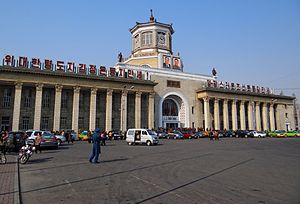Pyongyang station
P'yŏngyang 평양 | ||||||||||||||||||||||||||||||
|---|---|---|---|---|---|---|---|---|---|---|---|---|---|---|---|---|---|---|---|---|---|---|---|---|---|---|---|---|---|---|
 Street facade of the railway station | ||||||||||||||||||||||||||||||
| Korean name | ||||||||||||||||||||||||||||||
| Chosŏn'gŭl | 평양역 | |||||||||||||||||||||||||||||
| Hancha | ||||||||||||||||||||||||||||||
| Revised Romanization | Pyeongyang-yeok | |||||||||||||||||||||||||||||
| McCune–Reischauer | P'yǒngyang-yǒk | |||||||||||||||||||||||||||||
| General information | ||||||||||||||||||||||||||||||
| Location | Yŏkchŏn-dong, Chung-guyŏk, P'yǒngyang North Korea | |||||||||||||||||||||||||||||
| Owned by | Korean State Railway | |||||||||||||||||||||||||||||
| Platforms | 3 (2 island platforms) | |||||||||||||||||||||||||||||
| Tracks | 6 | |||||||||||||||||||||||||||||
| Connections |
| |||||||||||||||||||||||||||||
| History | ||||||||||||||||||||||||||||||
| Opened | 1906 | |||||||||||||||||||||||||||||
| Rebuilt | 1958 | |||||||||||||||||||||||||||||
| Electrified | Yes | |||||||||||||||||||||||||||||
| Original company | Chosen Government Railway | |||||||||||||||||||||||||||||
| Services | ||||||||||||||||||||||||||||||
| ||||||||||||||||||||||||||||||
Pyongyang station (Template:Lang-ko) is the central railway station of P'yŏngyang, North Korea.[1] It is located in Yŏkchŏn-dong, Chung-guyŏk.
Main information
The station is the start of the P'yŏngbu and P'yŏngŭi lines, which were adjusted from the Kyŏngbu and Kyŏngŭi lines used before the division of Korea to accommodate the shift of the capital from Seoul to P'yŏngyang. The P'yŏngŭi Line runs from P'yŏngyang to Sinŭiju, while the P'yǒngbu Line theoretically runs through Seoul and ends at Busan; in practice, however, the line ends at Kaesǒng. It is also served by the P'yǒngnam Line, which runs from P'yŏngyang to Namp'o, as well as the P'yŏngdŏk Line running from P'yŏngyang to Kujang.
Connections
P'yŏngyang station is the main station in North Korea and it connects most of the cities of the country: Chŏngju, Sinŭiju, Namp'o, Sariwŏn, Kaesŏng, Wŏnsan, Hamhŭng and Rason. Beside domestic routes, international trains link Pyongyang with the Chinese capital Beijing four times weekly (24 hours)[2] and the Chinese city of Dandong, located on the adjacent bank of the Yalu River.[3] Trains do connect Pyongyang with Moscow, however due to chronic delays these are off-limits to foreigners.[4] There are presently no scheduled trains to Seoul (about 250 km (155 mi) away), due to the separation of the two Koreas.
Local transit connections can be made at the station via Pyongyang Metro's Yǒngwang station (on the Ch'ŏllima Line), by Line 1 of the P'yŏngyang tram system and Pyongyang trolleybus lines 1, 2 and 10, with Pyongyang station being the terminus of all three lines.
Structure
The original station was constructed in the 1920s by the Empire of Japan who occupied Korea at the time, the original architectural style being akin to the original Seoul station built at a similar time, with the two cities once linked together.[5] During the Korean War, the original structure was destroyed and later on rebuilt in 1958[6] in the style of socialist architecture. The station presently has three floors above ground level as well as a basement.[6] The ground level houses a ticket desk exclusively for government employees. At the first floor there is a waiting room, toilets, a ticket desk and access to the trains. At the second floor there are offices for the staff and at the third the office of the station master. There are five platforms, with number 1 being the most spacious.
Speaker system
At 6am every day, a rendition of "Where Are You, Dear General?" is played over a speaker system at the station. Some think the song may be intended as a morning alarm call for local residents.[7]
Gallery
References
- ^ Information
- ^ "K27 and K28 | Beijing to Pyongyang train | TrainReview". trainreview.com. Archived from the original on 4 November 2020. Retrieved 31 October 2020.
- ^ "Train 51 and 52 | Dandong to Pyongyang train | TrainReview". trainreview.com. Archived from the original on 4 November 2020. Retrieved 31 October 2020.
- ^ "Train 651Ж and 652Ж | Tumangang (DPRK) Moscow train | TrainReview". trainreview.com. Archived from the original on 4 November 2020. Retrieved 31 October 2020.
- ^ "Pyongyang Railway Station". Visit North Korea. 23 May 2019. Retrieved 23 May 2019.
- ^ a b "Pyongyang train station to be refurbished – Railroad Ministry - NK News - North Korea News". 4 February 2014.
- ^ "Morning Chorus, Pyongyang's 6AM Wake Up Call". NK News. 28 July 2017. Retrieved 5 March 2021.
External links
- Introduction of Pyongyang Station (in Japanese)



